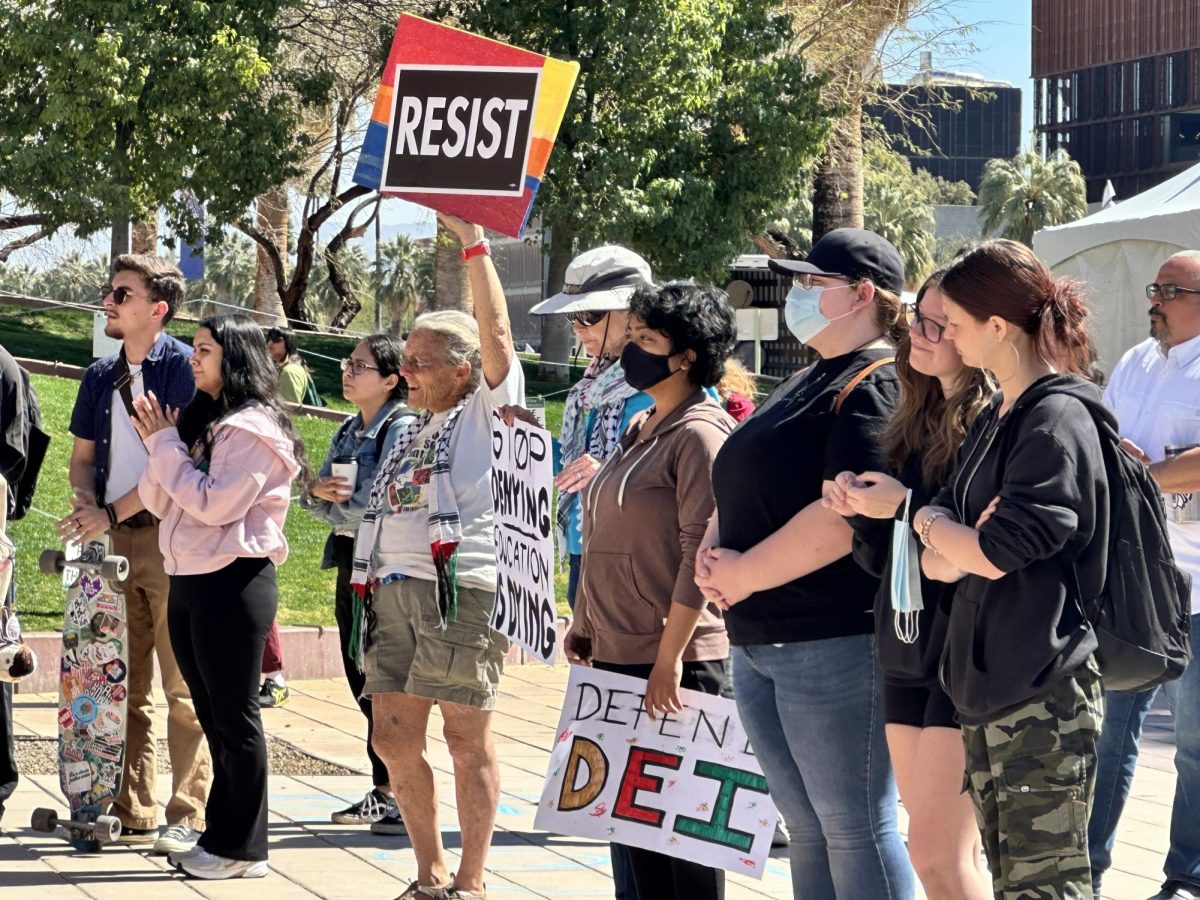As recent executive orders issued by President Donald Trump seek to end government support for programs promoting diversity, equity and inclusion at public universities across the country, some organizations and individuals at the University of Arizona are fighting to maintain diversity.
In his executive order “Ending Radical and Wasteful Government DEI Programs and Preferencing,” Trump called for DEI mandates, policies, programs and activities to be terminated. However, that order is currently on hold as it makes its way through the courts.
In the meantime, companies and universities across the country are responding, including some that are proactively removing DEI language and programs.
Last month, Arizona’s Senate President Warren Petersen called on all public Arizona universities to end DEI programs in February. In a letter directed at university presidents, now known as the “Dear Colleague” letter, which demanded for all educational institutions to ensure that their policies, obligations and programs are nondiscriminatory, including erasing the use of race preferences and stereotypes in admissions, hiring, promotion, scholarship, administration support, and other programs. In return, the institutions will lose federal funding if they choose not to comply.
The University of Arizona has already taken actions to comply, including quietly removing the phrase “Committed to diversity and inclusion” from the school’s land acknowledgment and taking down the Office of Diversity and Inclusion’s website.
In response, students and faculty are holding meetings to define and discuss DEI initiatives and how to protect them.

Two protestors snap in agreement with the speaker at a rally in front of the UA administration building on Feb. 27, 2025.
“To me, DEI means equitable opportunities without any discrimination or bias.” said Amara Riley, a sophomore studying ecology, who attended a recent rally in support of DEI measures. “It’s about creating a safe space for everybody from all backgrounds and being part of a welcoming community with people from the same culture.”
The campus group Feminists Organized to Resist, Create and Empower (FORCE) held an open meeting on Feb. 26 for students to discuss their concerns about how changes to DEI efforts impact their education and wellbeing.
“We hold a weekly meeting here at the Women’s Gender and Resource Center so we can talk about the current political and social climate of the world. Today is so students can reflect on what is said about DEI and inform others who just came here to learn about it,” said Christina Petrin, an intern at FORCE and president of Planned Parenthood Generation Action.
“I’ll be vulnerable and say that I’m afraid for it,” she added. “I think we all should use this time to amplify our thoughts about it. I would encourage anyone to get involved with petitions, and the best thing I can do is to just keep being informed.”

Phrases in support of DEI were written on the walkways in front of the UA administration building on Feb. 27, 2025. They include ‘Aquí estamos y no nos vamos’ and ‘Stand with cultural resource centers.’
Petrin said DEI isn’t just a label, it creates jobs and internships at the university and helps create safe spaces for students who identify as being under the DEI umbrella, including women, people of color and gender nonconforming students, faculty and staff.
DEI efforts encompass a broad scope of efforts aimed at increasing the presence of populations facing discrimination due to systemic oppressions such as racism, sexism, ableism, homophobia and transphobia in public institutions, including universities.
“As important as the cultural centers are, it would also affect something like the Disability Resource Center,” said Kid Hirabayashi, a freshman studying biomedical engineering. “If we lose the disability resources, people can’t go to school, we lose the part that allows us as humans to have an equal education.”
A Feb. 27 rally organized by Coalition of Black Students and Allies, MECHA and FORCE aimed to bring awareness to DEI initiatives and call out leaderson their decision, said Tara Mitchell, a member of the media committee at FORCE.
She said turnout was higher than expected, and that engagement by the campus community is necessary to respond to changes to DEI language.

Protesters wrote phrases in support of DEI on the walls and walkways of the administration building at the University of Arizona on Feb. 27, 2025.
“I do think we had a very diverse amount of people who all stood for the same thing for DEI, with the amount of posters we’re seeing, too, it was amazing to see those going to great lengths,” Mitchell said. “We’re basically telling Provost Ron Marx, ‘Hey, you’re actively taking away really important necessary sectors to people who need them.’”
She said the threat to cultural centers and DEI initiatives has galvanized students to demand action.
”This is just the start of the fight,” she said. “I hope more people will continue to realize what DEI really means.”
Petrin added that it’s scary knowing the Department of Education could be at risk, citing Trump’s campaign to shut it down, and emphasized the importance of community in times like these.
”We’ll do what we can together. We have that community aspect and we’ll be ready for when it comes at us and we take it down,” she said.
Arizona Sonoran News is a news service of the University of Arizona School of Journalism.










